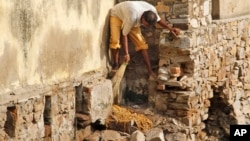Indian Prime Minister Narendra Modi has launched a massive nationwide cleanliness drive to spruce up the country and provide toilets to all households by 2019. The challenge will be daunting in a country whose sprawling cities often overflow with garbage due to poor waste disposal systems and where more than half the population does not have access to toilets.
Challenge: civic volunteerism
Prime Minister Narendra Modi literally wielded the broom Thursday in a poor colony housing sanitation workers in New Delhi before administering a pledge to tens of thousands of school children and government officials to spend two hours every week in cleaning up the country.
He asked people to make a beginning with themselves, their families, neighborhoods, workplaces and villages.
Ministers, lawmakers and school principals also picked up brooms and trash cans to sweep streets and clear garbage to raise public awareness of better sanitation in a country where littering is common and where cleaning is considered a task to be done by lower castes.
Modi urged India’s 1.25 billion people to turn the drive into a social campaign.
He said it takes time to change old mindsets and habits, and is a tough task. But if everyone joins hands to make it a mass movement, then India too will be counted among the world’s clean countries.
Clean India
Modi launched the Clean India campaign on the birth anniversary of Indian independence leader, Mohandas Karamchand Gandhi. Gandhi had called good sanitation more important than independence and urged his disciples to clean latrines to remove the stigma from a task traditionally assigned to lower castes.
Besides cleanliness, a major focus of the campaign will be to build toilets. More than half of India defecates in the open, which not only spreads diseases like diarrhea but also exposes women to the risk of sexual assault when they go into the fields after dark. A World Bank study estimated that poor sanitation could be costing India $54 billion in treatments for illnesses, early deaths and lost productivity.
No one questioned the campaign’s need in a country where poor urban planning means that sewage often flows into rivers and lakes and huge garbage dumps are a sore sight in rapidly expanding towns and cities. A former minister, Jairam Ramesh, once remarked that if there was a Nobel Prize for dirt and filth, India would win it.
But skeptics are questioning how the government will achieve the Prime Minister’s target of cleaning up India and providing toilets to all households by 2019 - the 150th birth anniversary of Gandhi.
Necessary change: Culture, belief system
They point to the complexity of the challenge. For example, building toilets is not the only problem. In rural India, there is often huge resistance to using them, partly due to age old cultural associations of latrines in or near the home with ritual impurity.
A study led by Diane Coffey, a visiting researcher from Princeton University, showed that 40 percent of 3,200 households surveyed in North India reported that even in homes with a latrine, at least one member preferred to use the fields. Speaking to VOA from the rural Sitapur district in Uttar Pradesh where she is working, Coffey called this a wake-up statistic.
“Open defecation, unlike in other places, where it has a negative connotation, here it is something that is completely normal, and even sometimes wholesome, like the fact that you have gone for a morning walk, and you have exercised your body and you have gotten up early. These are all signs of vigor and strength,” she explained.
However, Prime Minister Modi sounds optimistic. He has roped in India’s icons - Bollywood and cricket stars into the cleanliness campaign. And he is asking people to upload videos and photos of them cleaning garbage on social media in a bid to spread the message.
But there were some murmurs of resentment from officials about having to pick up brooms and dusters on a day that was meant to kickstart a long holiday weekend. Gandhi’s birth anniversary is a national holiday in India.
*a previous version of this story mistakenly stated that 23,000 households had been surveyed in North India
India’s PM Launches Massive Drive to Clean Up Country
update

NEW DELHI —





